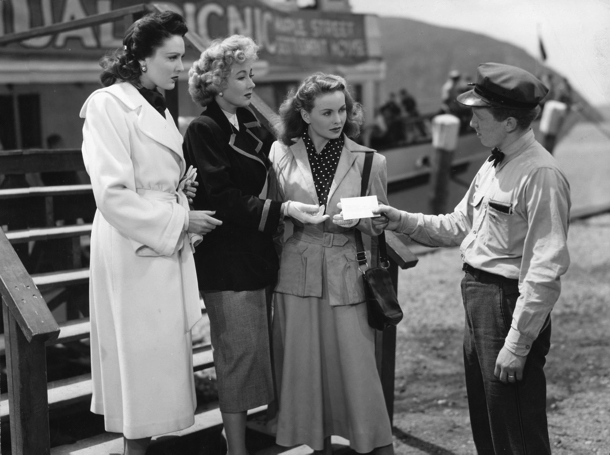
Dir.: Joseph L. Mankiewicz
Cast: Jeanne Crain, Linda Darnell, Ann Southern, Kirk Douglas, Paul Douglas, Jeffrey Lynn
USA 1949, 103 min.
It is difficult to understand how Mankiewicz managed to direct four so different films in the span of two years: A Letter To Three Wives and All About Eve (he received Oscars for Best Director and best screenplay in both cases), are the bookends, whilst his two film-noir productions of House of Strangers (1949) and No Way Out (1950) were, in comparison, rather unrecognised, although far more more weighty in their subject-matter.
A Letter to Three Wives is based on the novel ‘Letter to Five Wives’ by John Klempner (which appeared first in ‘Cosmopolitan’); the number of wives had been whittled down by 20th Century Fox boss Darryl F. Zanuck to three. In spite of this, the film feels much longer than 103 minutes – there are simply not enough dramatic turns (unlike in All about Eve) to sustain interest.
When three middle-class wives, Deborah Bishop (Crain), Rita Phipps (Sothern) and Lora Mae Hollingsway (Darnell) enter a pleasure boat to take care of under-privileged children, they receive a message from Addie Ross (voiced by Celeste Holme), that she is going to run away with one of their husbands – leaving them all in suspense as to which husband she had picked. During the boat trip we learn in flash-back about the (rather mundane) marriage problems and get to know the husbands: Brad Bishop (Lynn), George Phipps (K. Douglas) and Porter Hollingsway (P. Douglas). Deborah, who grew up in the countryside, is ill at ease in Brad’s upper-class family, furthermore, everyone in his circle expected him to marry Addie, who is adored by all the men in the film. Rita is a writer of radio plays, and her husband George, a teacher, feels somehow ‘castrated’, since he can’t compete with his wife financially. Finally, Lora Mae grew up poor, and her husband Porter (who owns a chain of nationwide department stores) somehow suspects that she has married him only for the money.
Needless to say, there is a happy ending, and it is unanymously re-affirmed that women cannot live without a husband. Furthermore, the enigmatic and supposedly very attractive Addie is just a cypher, shown only once and from behind. In positioning her as the sexually-alluring femme fatale, who looses out in the end to three insecure, but ‘needy’ women, Mankiewicz re-affirm society’s doctrine of male dominance. There is no attempt to question the hierarchical structure of marriage, and the rather tepid acting and stage-like camera movements combine with the stale narrative in a conservative image of society – as if the war and resulting women’s liberation had not happened. AS
SCREENING AT BFI DURING THE KIRK DOUGLAS SEASON